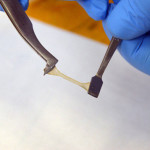 The life of fiber-optic cables, medical implants and other hard to repair in place objects could be extended by a drop of water self-heals a multiphase polymer derived from the genetic code of squid ring teeth, according to an international team of researchers.
The life of fiber-optic cables, medical implants and other hard to repair in place objects could be extended by a drop of water self-heals a multiphase polymer derived from the genetic code of squid ring teeth, according to an international team of researchers.
“What’s unique about this plastic is the ability to stick itself back together with a drop of water,” said Melik Demirel, professor of engineering science and mechanics, Penn State. “There are other materials that are self healing, but not with water.”
Demirel and his team looked at the ring teeth of squid collected around the world — in the Mediterranean, Atlantic, near Hawaii, Argentina and the Sea of Japan — and found that proteins with self-healing properties are ubiquitous. However, as they note in a recent issue of Scientific Reports, “the yield of this proteinaceous material from natural sources is low (about 1 gram of squid ring teeth protein from 5 kilograms of squid) and the composition of native material varies between squid species.”
So as not to deplete squid populations, and to have a uniform material, the researchers used biotechnology to create the proteins in bacteria. The polymer can then either be molded using heat or cast by solvent evaporation.
The two-part material is a copolymer consisting of an amorphous segment that is soft and a more structured molecular architecture. The structured portion consists of strands of amino acids connected by hydrogen bonds to form a twisted and/or pleated sheet. This part also provides strength for the polymer, but the amorphous segment provides the self-healing.
“If one of the fiber-optic cables under the ocean breaks, the only way to fix it is to replace it,” said Demirel. “With this material, it would be possible to heal the cable and go on with operation, saving time and money.



